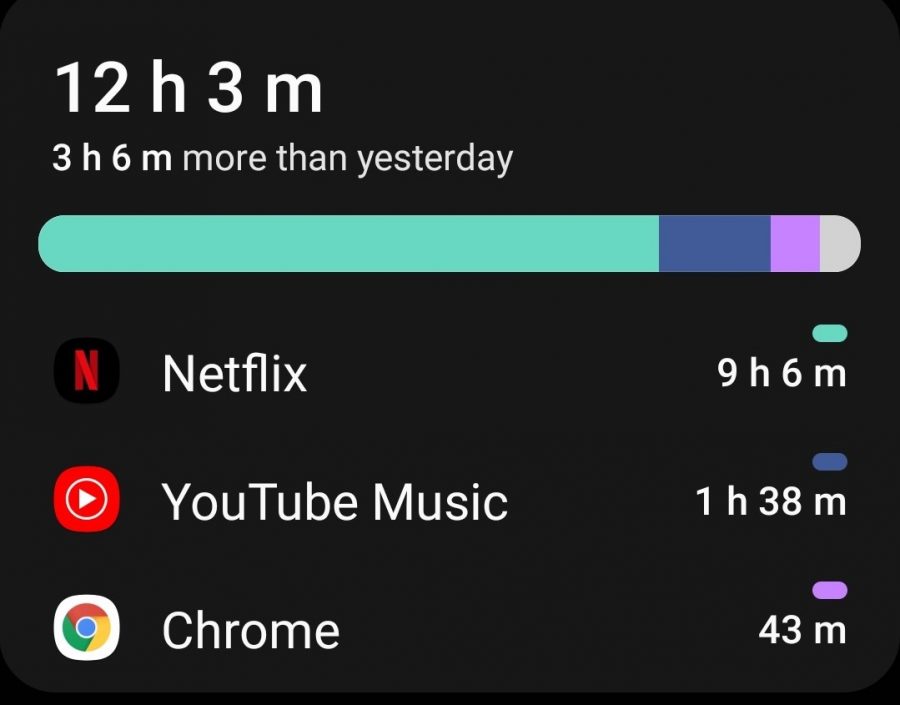I Monitored My Screen Time and was Shocked by What I Found Out
Photo by Screenshot by Sarah Terletsky
There are apps and various settings on your phone that can help monitor your time spent daily. Once you’ve really taken the time to look carefully at these reports, you’ll be shocked by how much time per day we spend looking at our screens.
I think it’s safe to say that we all spend a lot of time staring at screens all day, especially our phones. We use them for entertainment, social contact, schoolwork, and more. This begs the question, exactly how much time do we spend attached to our apps? I recorded my screen time for a week and found out an astounding answer to this question.
The answer is: way too much. I am embarrassed to admit that I spent an average of about 10 hours on my phone every day. About 7 of those hours were spent on Netflix, 2 was spent on YouTube Music, and the rest was spent on miscellaneous apps like Outlook and Chrome for shorter amounts of time. These jarring findings caused me to ask another question, how on earth did I manage to use accumulate so many hours? Well, I may have an answer.
It’s an obvious answer, I’m addicted to my phone, which is an ongoing trend in younger generations. According to the NBC News, the average American teenager (from ages 13 to 18) spends around 9 hours on entertainment alone, which is close to my average screen time. This is damaging in many ways. For example, I personally always felt that having music or background noise from shows and videos kept me motivated and concentrated on my work because without it my mind wanders, but apparently this might not be the case.
The founder and CEO, James Steyer, of the Common Sense Media group which conducted this research said that “One of the most interesting findings in this landmark research study is the fact that two thirds of teens think that they can multitask while doing their homework and they’re wrong. They simply can’t…” This actually interrupts your thinking which slows you down and prevents true comprehension.
Although spending too much time on your phone is clearly damaging, the article specifically referred to certain interactions with your phone such as texting or social media being a major distractor. Due to this specification, I believe that there are a few exceptions to technology being a distractor such as using it for white noise, relaxation purposes while working on something mundane and repetitive, or other uses that don’t require you to stop and interact with your phone or interrupt your train of thought.
During these observations, I also noticed that my addiction to blue light like a moth to a lamp has negatively impacted my sleep. According to sleep disorders specialist, Harneet Walia, if you don’t turn off your phone at least thirty minutes before bed you will not only be stimulated and anxious, but blue light can also suppress your production of melatonin, which controls your sleep cycle and internal rhythm.
However, I was aware of how screens negatively impact my sleep, so why was it still a problem? I concluded that this was due to my ‘just one more’ mentality, where I would bargain with myself and end up losing track of time, leaving me sluggish in the morning. This is something that I definitely need to fix!
This leaves one final question, how should I adjust my typical routine to cut back on my screen time? One thing I have in mind is to start using the helpful settings on my phone that restrict my screen time according to personal goals and my sleep schedule. I will also try to replace some of the leisure time spent on my phone with alternative activities such as drawing or reading. Finally, to improve my sleep I will try to stop using my phone thirty minutes before bedtime or watching sleep-specific content such as ASMR rather than exciting entertainment.
I encourage everyone to try recording their own screen time and to improve their relationship with their phone to help their overall health. Set goals for yourself and unplug once in a while to connect with the people around you.






